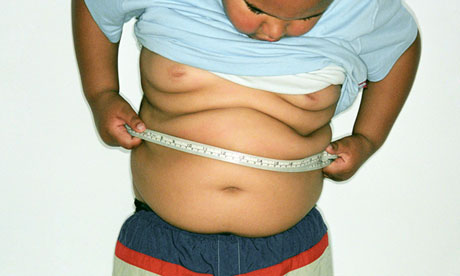
Children are more likely to have a can of a sugary drink a day than eat five portions of fruit and vegetables, and the vast majority have less than an hour's exercise, according to a new report.
The British Heart Foundation is very concerned that the lifestyles of modern children are setting them up for serious health problems in later life. Large numbers are in danger of developing coronary heart disease (CHD) as adults if they continue to skip meals and sport in favour of watching TV and drinking fizzy drinks, it says.
The data, published on Monday, suggests there has been little improvement in eating, drinking and exercise habits in spite of the concern about obesity and the launch of the government's child measurement programme, which warns parents if their children are overweight. About a third of under-16s across the UK are either overweight or obese.
The report, produced in partnership with the BHF health promotion research group at Oxford University, shows that 80% of children in England are not eating the recommended five portions of fruit and vegetables every day. Data from Scotland suggests they are more likely to eat crisps, biscuits or chocolates and sweets once a day or more (38%, 40% and 49% respectively).
Children also love their fizzy drinks – 39% of girls and 43% of boys get through a can a day. One can of cola contains up to nine teaspoonfuls of sugar, the BHF says.
A lot of snacking goes on, but children are apt to skip the most important meal of the day – breakfast – says the report. Almost half (47%) of boys and over a third (36%) of girls aged 13 go without it.
And the sedentary lifestyle has now taken over. At the age of 13, few are very active. Some 85% of girls and 73% of boys say they do not do even an hour's physical activity a day, which is the recommended minimum. Nearly three-quarters of 13-year-olds (68% of girls and 74% of boys) say they watch at least two hours of TV on a week day, leaving less time for sport and physical activity. Around a quarter of children (23% of boys and 25% of girls) spend at least six hours sitting down on Saturday and Sunday.
"These figures are a warning that many of our children are in grave danger of developing coronary heart disease in the future if they continue to live the same lifestyle. This is simply unacceptable," said Simon Gillespie, chief executive of the BHF.
The BHF has invested £1.2m in seven new community projects in Liverpool, Manchester, Wolverhampton, Inverclyde, Renfrewshire and two in Glasgow to teach children and young people how to make the right food choices and help them get more active. "But we can't act alone," said Gillespie. "Local decision makers need to identify the children and young people at greatest risk of poor health in their communities and take steps to help them improve their lifestyle. By ensuring children develop healthy habits now, we can give them a fighting chance of avoiding serious ill-health in the future."
Obesity in children is said to be levelling out, but BHF's senior dietician, Victoria Taylor, said there was every reason still to be concerned. "Even if it is levelling out, there is still a huge number of children who are obese or overweight who wouldn't have been so 30 years ago. These children are likely to continue to be obese throughout their childhood and adulthood.
"You can't say just because they are obese they will develop heart disease, but it is increasing their risk."

